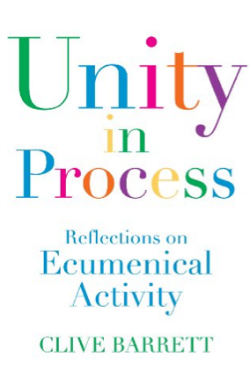Unity in Process - Reflections on Ecumenism
Unity in Process - Reflections on Ecumenical Activity
Clive Barrett (ed)
Darton, Longman and Todd
ISBN: 978-0232529432
Reviewed by Alec Gilmore

This is a book for those who see themselves as ecumenists, for those who have given up on ecumenism and for those who know nothing about ecumenism. There are 20 contributors, half of them from Yorkshire and the north-east with varied experience of ecumenism, from Mary Tanner (member of WCC Faith and Order since 1974) to more recent arrivals on the scene, clerical and lay, local, national and international.
The agenda is set in an Introduction by five church leaders with the familiar idea that ‘it is only through becoming one with you (God) that we can become one with one another’. Since our problems are mainly spiritual rather than theological ‘we need to feed ourselves with the spiritual lessons we have learned together over the last 30 years’ and because today there is far more ecumenical activity than we ever admit, we are encouraged to tell those ecumenical stories, listen to them, and open our eyes ‘to see the Other in the other’.
There is a recognition that in today’s world there is no likelihood of achieving the kind of unity we were looking for in the later half of the 20th century. Unity today is a process of coming together.
We are to think more of fluid communities and less about fixed institutions as CTE groups up and down the country are demonstrating, where localism and laity have combined to work together for what needed to be done, to relate to the local community (not just the church community), by-passing some of the obstacles that stood in the way, but never losing sight of the challenge to make the transition from personal to institutional ecumenical relations.
Local and global need each other. They feed on each other, but success comes not top down (from Councils) but bottom-up, from people working together and nurturing trust.
Unfortunately we have to wait a long time to get to ‘the stories’, described as ‘the second phase of ecumenism’, less national and more local, with less emphasis on the ultimate goal and more on interim questions and how we can make the most of living and working together where we are.
They are somewhat disappointing when we get there but the change of emphasis is what matters and the stories are sufficient to enable us to re-locate ourselves in the ecumenical world and increase our awareness of what is already going on around. In this way it paves the way for a much needed change of emphasis from John 17:21 to 1 Corinthians 12: 12-27. The book is well documented and indexed and could make a considerable contribution to revive the faint-hearted, energise the disappointed and stimulate the new girls and boys on the block.
The Revd Alec Gilmore is a Baptist minister
Baptist Times, 30/01/2014